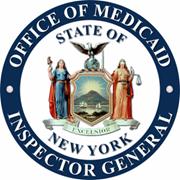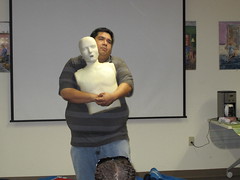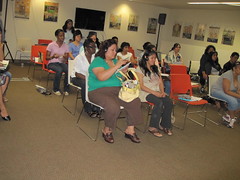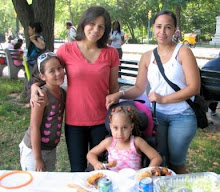The event gave us the opportunity to honor Dr. Pedro Noguera (above left), who is the Peter L. Agnew Professor of Education at New York University, for the work he does to champion children and promote student achievement. His immense scholarship and research on urban education prompted us to recognize him with the first ever Dr. Sally Romero Award for distinguished service to children, which was presented to him by Dr. Romero's daughter, Norma Romero-Mitchell.
We also honored New York State Assemblyman Robert J. Rodriguez (above right) with the Community Service Award for his tireless work in building the infrastructure that will ensure access to housing and business development, as well as cultural and social services in East Harlem. Yolanda Sanchez, an institution in the Latino community who has spent over thirty years in human services, presented him with the award. Both honorees also received a citation from the NY State Assembly.
The evening was dedicated to two of our very own heroines who are no longer with us. Dr. Sally Romero was President of Sinergia's Board of Directors until her untimely passing last summer. Christine Cuadra was a beautiful young woman who stood out in her vibrant red dress at our last gala in 2008. She too has passed on but we will never forget her dedication and hard work with the homeless families at Sinergia and her unwavering support to her mother, Executive Director Myrta Cuadra-Lash.
We were also thrilled to announce that June 12th was proclaimed Sinergia Day by the Council of the City of New York. The current President of Sinergia's Board of Directors, Dr. Len Torres (above), read the inscription, which says in part: "On behalf of all New Yorkers we commend Sinergia for its leadership, vision, faith in families and its abiding commitment to and advocacy for children and adults with disabilities." We want to thank the office of New York City Councilwoman Melissa Mark Viverito for arranging this proclamation. As we approach our 35th year, we will continue to build on our achievements.
The Ray Santos Orchestra (above) played a mix of Latin salsa and romantic boleros which had everyone congregating on the dance floor.
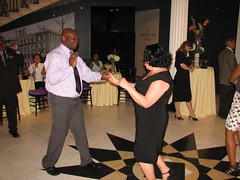
One of the items in the silent auction was a gorgeous oil painting (above) by artist Dianne Smith, former boardmember of Sinergia.
Dr. Gayle Haines (above left), who organized the silent auction, chats with Myrta Cuadra Lash and Beth Torres (above right).
Zenaida Mendez of the Manhattan Neighborhood Network (far left) and Dr. Marta Moreno Vega of the Caribbean Cultural Center African Diaspora (3rd, l. to r.) pose with the honorees.











